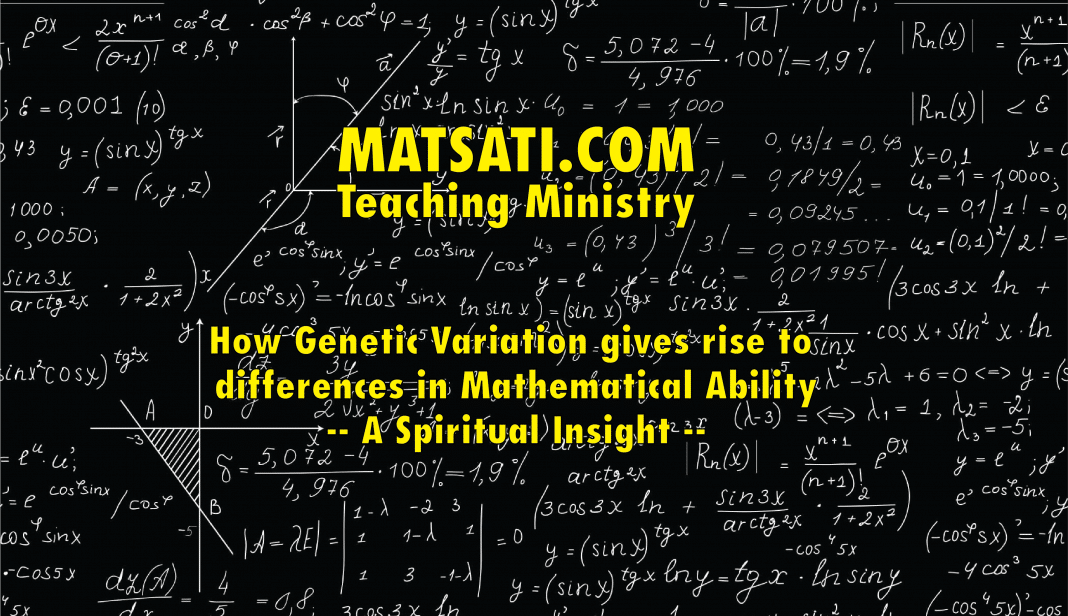A recent publication [1] reports on a gene called ROBO1 which is associated with early anatomical differences in a brain region that has a role in our understanding of numbers and math, potentially explaining how genetic variability shapes the aptitude of children in mathematics. Researchers in this study used test scores from second grader’s math to study the genetic variations of the ROBO1 gene and how this is associated with the part of the brain that promotes increased mathematical ability.
References
- Skeide MA, Wehrmann K, Emami Z, Kirsten H, Hartmann AM, Rujescu D, et al. “Neurobiological origins of individual differences in mathematical ability.” (2020) PLoS Biol 18(10): e3000871. doi.org/10.1371/journal.pbio.3000871
Mathematical ability is a known inheritable thing and is related to several genes that play a role for brain development. It is also known that genetic variability can lead to differences in mathematical ability. To address this gap in our understanding, researchers combined genotyping with brain imaging in unschooled children without mathematical training. The researchers analyzed eighteen single nucleotide polymorphisms (SNPs)-genetic variants affecting a single DNA building block in 10 genes previously thought to be related to mathematical performance. They then used the brain imaging technique (MRI) to study the relationship between the variations in the gene and the volume of nerve cell bodies in the brain. The sample population was 178 children, ages ranging from 3 to 6 years old. They identified regions in the brain whose nerve cell volume could predict math test scores in the second grade. The researchers found variations in the ROBO1 gene that regulates prenatal growth of the outer layer of neural tissue in the brain for mathematical ability. The volume of nerve cells along with gene variation led to the ability to predict the children’s ability to perform well on math tests even to seven and nine years of age. This research shows how genetic variability can shape mathematical ability by influencing the early development of the brain’s basic mathematical processing system.
The Spiritual insight that we receive from this type of research is related to the genetic inheritance of mathematical ability. This type of research draws out questions of whether one needs to be intelligent in order to understand God’s word. The approach for studying God’s Word, the Bible, understanding the natural world, and living our lives for the Lord God of Israel rests upon this very important question. Does one need to be intelligent in order to understand what the Lord God is looking for in our lives? This is related to whether we should use man’s wisdom or God’s wisdom? In the Scientific community, man’s wisdom supersedes God’s wisdom, we can see this also in the Christian community on questions of the science of origins who disregard the historical narrative of the creation account. There appears to be a broad disregard for God’s wisdom which has resulted in it becoming more difficult to help our brothers and sisters in the Messiah, and the world to understand that it was in wisdom God had made all things. (Tehillim / Psalms 104:24)
The understanding that God is our Creator according to Bereshit / Genesis 1-2, is the basis for understanding why the Scriptures (Bible) has the answers to life. As the faithful followers of God’s Word, and of Yeshua, our lives, our faith, and our understanding of the world around us is based upon the authority of God’s Word. The Bible touches every aspect of our lives in morals and ethics which dominates how we walk before God. We are also told (John 14) how it is by faith in Yeshua and the Spirit’s leading that we are able to discern the differences between the wisdom of man and of God. As we study the bible, it is interesting to discover that the Apostle Paul also considered this issue of wisdom when speaking to the first century gentile believers. As we study the letters of Paul we can see how the first century believers also had problems with discerning the truth, and understanding the differences between man’s wisdom and God’s wisdom.
Reading Paul’s letter to the Corinthians, we learn how the people of Corinth also desired man’s wisdom as opposed to God’s wisdom similar to the scientific community today. According to 1 Corinthians 2:1-16, Paul speaks to the Greek community of the difficulty of understanding his message of Yeshua when adopting a perspective that is founded upon man’s wisdom. This becomes apparent because the Greek culture highly honored one who had the ability to speak well and have the effective use of language (rhetoric). In those days, men would stand on the street corners speaking to the people, and people would gather around to just hear well orated speeches. They were always trying to hear or understand a new thing. The listeners would give money to the person who gave the best speech. The Greek culture was mostly concerned with the exchange of new ideas and concepts centered upon the philosophical meaning of life. The contrast between men’s wisdom as opposed to God’s wisdom is illustrated in how Paul addresses the Corinthians according to 1 Corinthians 2:1-16.
1 Corinthians 2:1-16
2:1 And when I came to you, brethren, I did not come with superiority of speech or of wisdom, proclaiming to you the testimony of God. 2:2 For I determined to know nothing among you except Jesus Christ, and Him crucified. 2:3 I was with you in weakness and in fear and in much trembling, 2:4 and my message and my preaching were not in persuasive words of wisdom, but in demonstration of the Spirit and of power, 2:5 so that your faith would not rest on the wisdom of men, but on the power of God. 2:6 Yet we do speak wisdom among those who are mature; a wisdom, however, not of this age nor of the rulers of this age, who are passing away; 2:7 but we speak God’s wisdom in a mystery, the hidden wisdom which God predestined before the ages to our glory; 2:8 the wisdom which none of the rulers of this age has understood; for if they had understood it they would not have crucified the Lord of glory; 2:9 but just as it is written, ‘Things which eye has not seen and ear has not heard, And which have not entered the heart of man, All that God has prepared for those who love Him.’ 2:10 For to us God revealed them through the Spirit; for the Spirit searches all things, even the depths of God. 2:11 For who among men knows the thoughts of a man except the spirit of the man which is in him? Even so the thoughts of God no one knows except the Spirit of God. 2:12 Now we have received, not the spirit of the world, but the Spirit who is from God, so that we may know the things freely given to us by God, 2:13 which things we also speak, not in words taught by human wisdom, but in those taught by the Spirit, combining spiritual thoughts with spiritual words. 2:14 But a natural man does not accept the things of the Spirit of God, for they are foolishness to him; and he cannot understand them, because they are spiritually appraised. 2:15 But he who is spiritual appraises all things, yet he himself is appraised by no one. 2:16 For who has known the mind of the Lord, that he will instruct Him? But we have the mind of Christ. (NASB)
Paul stated that he did not come with a superior way of speaking or with the wisdom of man when he brought the testimony of God to the Corinthians. He brought the teaching of Yeshua the Messiah in weakness, fear, and trembling—and by the demonstration of the Spirit in the power of God, not by enticing words. Furthermore, Paul wrote that we who are in Christ have “… received, not the spirit of the world, but the Spirit who is from God, that we might know the things that have been freely given to us by God” (1 Corinthians 2:12). It is the Spirit of God that helps us to know and understand the things of God. When we step back and look at the Scriptures as a whole, we see the good news of the message of a loving God, who is merciful, and forgiving, and how He sent his son so that we could have forgiveness for sin. The forgiveness of sin draws in the message on the consequences of disobedience, Paul wrote about the hopelessness of sin before God where we must understand that the “wages of sin is death” (Romans 6:23). It is difficult to understand this foundational concept while using the wisdom of man. When looking at the world around us, it is imperative we base our thinking about it on the Scriptures since it is our ultimate authority and the infallible source of God’s revealed wisdom.
Through observation and experimentation, we have been able to understand the way in which the world functions via the scientific principles (Chemistry, Physics, Mathematics, and Biology). Similar to the way in which we study the world, it is also possible to observe how the God of Israel works according to His Word. The ability to observe, to know, to understand, and to experience God’s working in this world is by the way He works in and through our lives. This is enabled by the indwelling of God’s Holy spirit. This is what Paul thought when he said, “But the natural man does not receive the things of the Spirit of God, for they are foolishness to him; nor can he know them, because they are spiritually discerned” (1 Corinthians 2:14). When studying science from both a professional and recreational aspect while using the Bible as a starting point, there are many processes we can observe and use to give a reasoned evidence for the handiwork of God. The word “gospel” הבשורה means “good news,” which is the message of forgiveness for sin through the sacrifice Yeshua made on our behalf. This is the plan of redemption that is illustrated in the life of Moshe delivering Israel from bondage and bringing them before the Lord making a covenant with Him. The gospel is the message of redemption for those who will trust in the Messiah of God in order to be reconciled to a just and holy God. The essential content of this message is laid out in the Torah and throughout all of Scripture, ultimately revealed to us in the NT. In Paul’s letter to the Corinthians, he lays out the content of the gospel message saying, “Now, brothers and sisters, I want to remind you of the gospel I preached to you, which you received and on which you have taken your stand. By this gospel you are saved, if you hold firmly to the word I preached to you. Otherwise, you have believed in vain. For what I received I passed on to you as of first importance: that Christ died for our sins according to the Scriptures, that he was buried, that he was raised on the third day according to the Scriptures” (1 Corinthians 15:1–4).
The current Scientific research presents to us a new study of the ROBO1 gene which has been shown to regulate the volume of grey matter (volume of nerve cell bodies) in the brain in the region scientists believe is responsible for mathematical ability. This type of research draws out questions of whether one needs to be intelligent in order to understand the message of God’s word. The Scriptures are written at a 5th grade level, and so reading the Scriptures should not be the challenge. The essential element of understanding the message God wants us to hear is a matter of faith. The message God is speaking to us is related to atonement for sin and forgiveness. The Lord sent His son Yeshua to die for our sins. This is a very important concept as Romans 3:23 states, “For all have sinned and fall short of the glory of God.” The reality of sin needs to be acknowledged by all who approach the God of Israel seeking forgiveness and salvation. We also read elsewhere Paul saying, “Now the Spirit expressly says that in latter times some will depart from the faith, giving heed to deceiving spirits and doctrines of demons.” (1 Timothy 4:1) The important aspect of this statement is that in the latter days there are going to be some who will depart from the faith as a result of coming into contact with demonic influence. Notice how demons are said to be the ones who are working to lead people away from their faith in Yeshua and from the God of Israel. When we consider intelligence in relation to the wisdom of man and the wisdom of God, the wisdom of God is His Word, and the wisdom of Man is vain philosophy and quite possibly the working of the evil one in one’s life. The human mind is very complex, and we may not even realize what is influencing us and drawing us away from the Lord.









